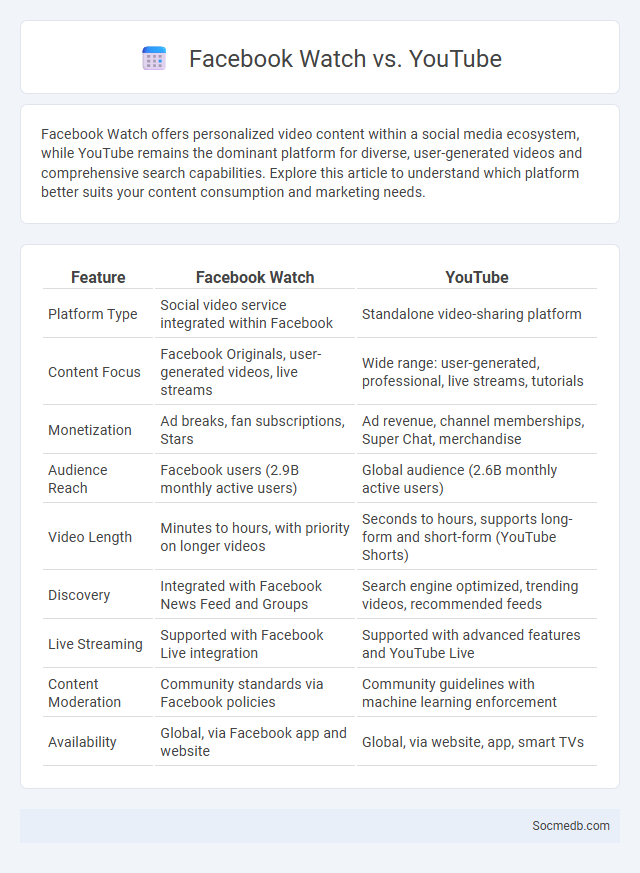
Photo illustration: Facebook Watch vs YouTube
Facebook Watch offers personalized video content within a social media ecosystem, while YouTube remains the dominant platform for diverse, user-generated videos and comprehensive search capabilities. Explore this article to understand which platform better suits your content consumption and marketing needs.
Table of Comparison
| Feature | Facebook Watch | YouTube |
|---|---|---|
| Platform Type | Social video service integrated within Facebook | Standalone video-sharing platform |
| Content Focus | Facebook Originals, user-generated videos, live streams | Wide range: user-generated, professional, live streams, tutorials |
| Monetization | Ad breaks, fan subscriptions, Stars | Ad revenue, channel memberships, Super Chat, merchandise |
| Audience Reach | Facebook users (2.9B monthly active users) | Global audience (2.6B monthly active users) |
| Video Length | Minutes to hours, with priority on longer videos | Seconds to hours, supports long-form and short-form (YouTube Shorts) |
| Discovery | Integrated with Facebook News Feed and Groups | Search engine optimized, trending videos, recommended feeds |
| Live Streaming | Supported with Facebook Live integration | Supported with advanced features and YouTube Live |
| Content Moderation | Community standards via Facebook policies | Community guidelines with machine learning enforcement |
| Availability | Global, via Facebook app and website | Global, via website, app, smart TVs |
Introduction: Comparing Facebook Watch, YouTube, and Watch
Facebook Watch, YouTube, and Instagram's Watch feature each offer distinct video streaming experiences tailored to diverse audiences. Facebook Watch emphasizes community interaction with creator-driven content, YouTube provides an extensive library of videos alongside robust monetization options, while Instagram Watch integrates short-form videos designed for mobile consumption and seamless social sharing. These platforms continuously innovate to capture user engagement through personalized recommendations and diverse content formats.
Platform Overview: Key Features and User Base
Social media platforms offer diverse features such as real-time messaging, content sharing, live streaming, and algorithm-driven feeds designed to maximize user engagement. Key platforms like Facebook boast over 2.9 billion monthly active users, Instagram attracts approximately 2 billion users with a focus on visual content, and Twitter serves around 450 million users emphasizing real-time news and conversations. Advanced targeting capabilities and integrated advertising options enable brands to reach specific demographics effectively across these highly interactive user bases.
Content Variety: Originals and User-Generated Media
Content variety significantly enhances social media engagement by combining originals with user-generated media, offering diverse perspectives and authentic interactions that captivate audiences. Your social media strategy should balance professionally produced content with genuine posts from users to foster community trust and increase reach. Leveraging this mix boosts algorithm performance, as platforms prioritize content that sparks meaningful engagement.
Monetization Options for Creators
Social media platforms offer diverse monetization options for creators, including ad revenue sharing, sponsored content, and fan subscriptions. By leveraging tools like brand partnerships and affiliate marketing, you can maximize your income potential while growing your online presence. Understanding platform-specific features such as YouTube's Super Chat or Instagram's Shopping Tags enables tailored revenue strategies for sustained creator success.
Audience Engagement and Community Tools
Social media platforms enhance audience engagement through interactive features like polls, live videos, and story reactions, fostering real-time communication and deeper user involvement. Community tools such as groups, forums, and hashtag campaigns facilitate niche audience building, enabling brands to cultivate loyal communities around shared interests. Analytics insights help track engagement metrics, allowing for tailored content strategies that improve user retention and participation.
Algorithm and Recommendation Systems
Social media platforms rely heavily on advanced algorithms and recommendation systems to curate personalized content for You, increasing engagement and user retention. These systems analyze Your behavior, preferences, and interactions to deliver relevant posts, ads, and friend suggestions tailored specifically to Your interests. Optimizing these algorithms is crucial for enhancing user experience and maximizing the platform's reach and effectiveness.
Mobile & Smart TV Accessibility
Mobile and Smart TV accessibility enhances your social media experience by enabling seamless content consumption across diverse devices. Optimized apps ensure that visually and hearing-impaired users can navigate platforms effortlessly through features like voice control, screen readers, and customizable captions. This inclusive design empowers broader audience engagement and fosters meaningful interactions on popular social media networks.
Advertising and Revenue Models
Social media platforms primarily generate revenue through targeted advertising models that leverage user data to deliver personalized ads, increasing engagement and return on investment for advertisers. Prominent revenue streams include pay-per-click (PPC) ads, sponsored content, and influencer partnerships, which capitalize on the platform's vast user base and detailed demographic insights. Advanced algorithms enhance ad placement efficiency, driving higher click-through rates and maximizing monetization opportunities for platforms like Facebook, Instagram, and TikTok.
Data Privacy and Security Policies
Social media platforms implement robust data privacy and security policies to protect user information from unauthorized access and cyber threats. These policies include encryption, two-factor authentication, and strict data handling protocols to safeguard your personal data. Regular updates and transparent privacy settings allow you to control what information is shared and with whom.
Future Trends and Platform Evolution
Social media platforms are rapidly evolving with advancements in artificial intelligence, augmented reality, and immersive technologies driving future trends. Personalized content algorithms and enhanced user data privacy measures are expected to redefine user engagement and platform trust. Emerging platforms will prioritize seamless integration of social commerce and interactive features to meet growing consumer demands.
 socmedb.com
socmedb.com